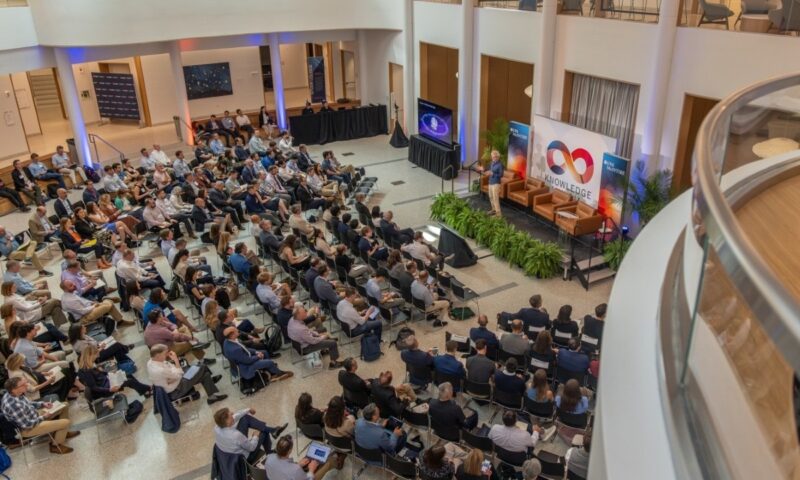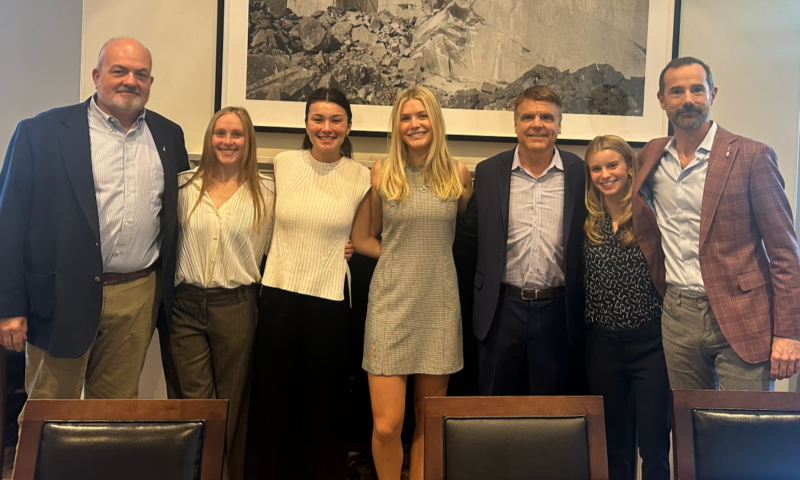As far as famous quotes go, one remark from a TED Talk by Methodist minister Donald Davis will likely be etched in the minds of University of Virginia sports fans forever.
“If you learn to use adversity right, it will buy you a ticket to a place you couldn’t have gotten to any other way.”
It’s a quote that UVA Men’s Basketball Head Coach Tony Bennett’s wife, Laurel, shared with him in the aftermath of the team’s shocking loss to University of Maryland, Baltimore County in the opening round of the 2018 NCAA Tournament.
It’s a quote that, a little over a year later, Bennett—as he reached into his pocket and pulled out two tickets from the UMBC game—shared with fans at the program’s NCAA championship celebration at John Paul Jones Arena.
It’s also a quote that, given the worldwide coronavirus pandemic, may offer hope.
On Tuesday afternoon, UVA Director of Athletics Carla Williams reflected on the quote while addressing students enrolled in a McIntire School of Commerce course.
“[It] simply means we are all going to have disappointments, and what matters most is how you respond to that,” she said. “How do you respond to losing? How do you respond to failure?
“You will lose. It’s inevitable. What we talk about is ‘How do we plan to excel after we lose?’ What is our plan to excel? How do we learn from defeat? What went wrong? What would we change?’”
Williams, via the Zoom videoconferencing platform, was the guest speaker in COMM 4681, one of four capstone courses available for completion of the pan-University minor in entrepreneurship that McIntire hosts in partnership with the Frank Batten School of Leadership and Public Policy and the School of Engineering.
The course, taught by Assistant Professor of Commerce Eric Martin and McIntire graduate and former Cavalier football player Doug Duenkel (Mcntire ’92), serves as a lab/accelerator for student teams pushing startup, social, and corporate innovation projects into the market.
Martin said Williams was the perfect guest speaker.
“Her work to innovate at the intersection of [Division I] sports, the University, and its student-athletes is a fascinating look into the vision and persistence required to make change happen in large organizations,” he said.
During the session, Williams told students that one of her priorities with her staff has been figuring out ways to use the ongoing COVID-19 crisis “to be better.”
“How do we take a leap forward when a lot of our peers may be standing still?” she said. “How do we do that? What does that look like? What does it mean? How does that work? How do we make that happen?”
As it pertains to leading the athletics department, Williams said she has four guiding principles.
“I don’t have a lot, but the ones I do have mean a lot to me,” Williams said. “I want to share them with you because I think it sets the tone for why I manage the way I manage.”
Below, she explains each of those principles.
Humility
“I’ve worked at Florida State, Georgia, Vanderbilt, and now Virginia, and have worked with a lot of coaches who are ultra-successful,” she said, “and I’ve paid close attention to their personalities, because I love being a student and I think we should all be in a position to where we’re always seeking to learn. So I’m an observer, and I pay a lot of attention to people’s personalities and communication skills and characteristics to try and get an idea of why certain people are successful and certain people are aren’t.
“For me, I’m always learning—and I think a big part of that is humility. It’s really important because with humility, I acknowledge that I do not know everything and that I have a lot to learn. That has helped me throughout my career.”
Hustle
“I am drawn to people who work extremely hard, people who do more than what is expected of them. That’s been a big part of why I’m here today at UVA, and I think it’s an admirable attribute to have—to pride yourself on hard work.
“I have always done more than what was expected of me. Oftentimes, people may not excel because their external motivation is not lifting them higher, and that somehow dulls their internal motivation. I’ve worked really hard to be mindful of my internal motivation and to be internally motivated to do more than what others expect. I just think a lot of times, people put artificial ceilings and limits on people, and it’s up to us as individuals to outgrow those.”
Education
“I have a Ph.D. Do you need a Ph.D. to be an athletics director? No, you do not. But when I was coming up in this industry, I really wanted to remove any excuses from presidents for not hiring me as an athletics director. So I didn’t have to have a Ph.D., but I love having a Ph.D. It’s been great for me because a lot of my work, and what I believe to be an important aspect of collegiate athletics, is the fact that we are a part of higher education and not apart from higher education.
“And so having a terminal degree has helped me in my interactions with faculty members and presidents and provosts and so forth. Not to mention, it allows me to push student-athletes to gain as much education as they possibly can.”
To Whom Much Is Given, Much Is Required
“I really do believe this. I think I have worked really hard, but I have been blessed with a lot of great opportunities at different places along the way. So it’s important for me to acknowledge that and also to give back.”
As the one-hour class continued, Martin, Duenkel, and the students dissected what Williams was saying in real time, via Zoom’s chat function.
Martin asked the students about the similarities between Williams’ job in the athletics department and that of a CEO at a startup.
“Managing multiple stakeholders—players, coaches, university officials, etc.,” student Kavya Ravikanti (Engineering ’20) replied. “Making sure they stay afloat from season to season, looking at the revenue sources and figuring out where to spend it for maximum impact on the program and for their goals.”
Shortly after reflecting on the now-famous Davis quote, Williams told the class about a passage from a speech by Teddy Roosevelt that has always meant a lot to her—“The Man in the Arena.”
“I love it,” she said. “I go back, periodically, to re-read it because it’s exactly this—there is no shame in failure because there was courage to get into the arena to start with.
“It’s “How do you rebound? How do you respond to adversity?’”
By Whitelaw Reid, University News Senior Associate, Office of University Communications, wdr4d@virginia.edu, 434-924-7499. This story first appeared in UVA Today April 15, 2020.



